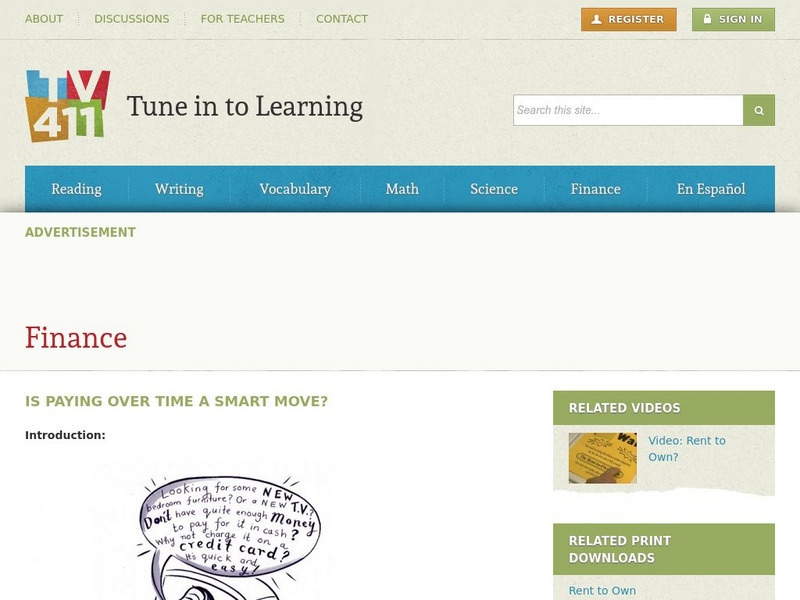Federal Reserve Bank
Creditors’ Criteria and Borrowers’ Rights and Responsibilities
Discover what criteria creditors use for making loans (the 3 Cs of Credit), and impress upon your young adults the rights and responsibilities related to using credit. Pupils role play as individuals seeking or providing credit, as...
Federal Reserve Bank
Invest in Yourself
What are the different ways that people can invest in their human capital for a better future? Pupils participate in an engaging hands-on activity and analyze data regarding unemployment, the ability to obtain an education, and median...
Visa
The Danger of Debt: Avoiding Financial Pitfalls
How can our perspectives of borrowing and returning influence the way we view credit? Pupils explore the concept of debt, how it impacts our ability to obtain credit, and finally the ways in which we can work to alleviate debt.
Visa
Using Credit Wisely
Receiving credit can be both a benefit and a curse. Prepare your learners to make wise credit choices by studying how credit influences credit scores, identifying the different components of credit cards, and exploring major consumer...
Visa
Nothing But Net: Understanding Your Take Home Pay
Introduce your young adults to the important understanding that the money they receive from their paychecks is a net amount as a result of deductions from taxes. Other topics covered include federal, state, Medicare and social...
Visa
Savvy Spending: Sharpening Money Decisions
Do you really need that new laptop/phone/dress/jacket/etc.? Financial decisions require us to distinguish between our wants and our needs. Through discussion and the evaluation of scenarios on provided worksheets, this resource...
Curated OER
Marriage and Financial Goals, Budgeting Strategies
There is no more useful life skill to learn than budgeting and setting financial goals. It's math that is used by every person, everyday. Learners examine the responsibilities and costs involved in family economics. Through a series of...
Center for Literacy and Disability Studies
Personal Financial Literacy: Checking
After researching local banks and the checking account benefits offered by each, class members practice filling out a deposit slip, writing a check, and keeping a transaction register.
California Department of Education
California CareerZone Make Money Choices Student Workbook
An activity challenges scholars to make smart money choices. While visiting the California CareerZone website, pupils choose between budgeting for one's lifestyle or salary and complete a two-page activity based on the information...
Federal Reserve Bank
Savvy Savers
What are the benefits and risks of saving in an interest-bearing account? Pupils explore concepts like risk-reward relationship and the rule of 72, as well as practice calculating compound interest, developing important personal...
Federal Reserve Bank
Beatrice’s Goat: A Lesson on Savings Goals
Youngsters learn the meaning of saving and how to reach savings goals by first reading a story of a young Ugandan girl who is gifted a goat, and then discovering the opportunity costs of savings decisions made by her and her family.
Curated OER
Money Management Part II: Checking Accounts
Having money is great, learning to manage it wisely is imperative. First, the class has a discussion on the value and convenience of having a checking account. Then, they practice filling out deposit slips, keeping an account register,...
Curated OER
Spend, Save, Invest or Donate (9-12)
Young scholars explore the concept of personal finance. In this philanthropy lesson, students examine decisions they make about money as they discover the definitions of philanthropy, resources, scarcity, choice, benefits, costs,...
Curated OER
Money Management Part I: Money and You: An Introduction to Money Management and Budgeting
Learners discuss personal finance and create personal budgets. They discuss the importance of managing their money and how money management skills impact their future. Note: This lesson is intended for use with a SMART Board and...
Curated OER
Checks and Balances
Students discuss elements of financial planning. In this personal finance lesson, students practice filling out personal banking information. Students conduct research using the Internet and a PowerPoint presentation to find...
Curated OER
Scoring a Financial Education
Students explore the concept of money management. In this money management lesson, students read an article about students taking a finance course in high school and college. Students discuss the importance of money management. Students...
Curated OER
Minding Your Money
In this money worksheet, students solve 5 word problems pertaining to buying snacks at a shop. Students determine how much money is left after subtracting the cost of their snack from a specified amount of money.
Curated OER
Money Management: Paying Bills
Students investigate the concept of paying bills by writing checks. They practice writing a check with the specific elements filled out correctly and then record the amount of it in the check register. Students also extend the lesson...
Curated OER
Lesson 4: Credit
Students discuss and define credit and different types of credit, identify two positive things about using credit properly, identify two negative things about using credit improperly, and identify how and where to obtain a credit report.
Curated OER
Careers Lesson: Budget Analysis
Ninth graders examine money management. They study percentages, inequalities, fixed and variable expense calculations in order to develop an understanding of how these concepts apply to budgeting a lifestyle for a specific career.
Curated OER
Fun With Estimation
Students get an opportunity to practice estimation skills in a real life situation after a unit on estimation has been taught.
CNN
Cnn Money: Tax Guide
Information about taxes including paying taxes, filing a return, audits, tax planning.
Education Development Center
Tune in to Learning: Is Paying Over Time a Smart Move?
At T.V. 411 you can explore the concept of paying over time with situations involving credit cards, rent to own items, and more. This interactive lesson gives the learner an opportunity to make decisions about money management.
























